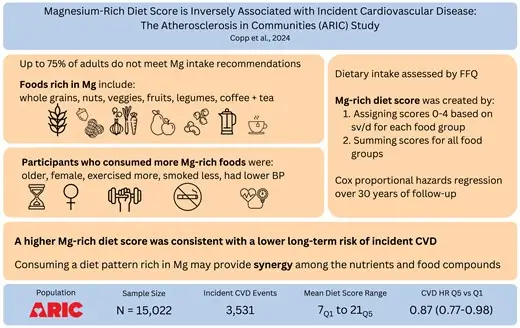Power Up Heart Health: ARIC Reveals That a Magnesium-Rich Diet Score Slashes Cardiovascular Risk!
Magnesium-Rich Diets and Cardiovascular Health
A higher intake of magnesium-rich foods—such as whole grains, nuts, vegetables, fruits, legumes, coffee, and tea—is associated with a modestly lower risk of incident cardiovascular disease (CVD) and coronary heart disease (CHD).
No Significant Association with Ischaemic Stroke
Despite the overall cardiovascular benefits, no significant association was found between a magnesium-rich diet and risk of ischaemic stroke, indicating a more selective protective effect on certain cardiovascular outcomes.
Diet Quality and Risk Reduction
Participants with the highest magnesium-rich diet scores demonstrated up to 18% lower risk of CHD and 13% lower risk of CVD compared to those with the lowest scores, even after adjusting for demographics, lifestyle, and clinical risk factors.
Reinforcement of Dietary Counselling
These findings reinforce the importance of integrating dietary counselling into routine clinical care, particularly emphasizing magnesium-rich food sources as part of a heart-healthy dietary pattern.
Longitudinal Evidence from a Diverse Cohort
The results are drawn from over 30 years of follow-up in a large, racially diverse U.S. cohort (ARIC study), lending strong epidemiological support to the role of diet in cardiovascular risk modification.

Conclusion
This long-term prospective analysis from the ARIC study underscores the potential cardiovascular benefits of a magnesium-rich dietary pattern. Higher consumption of magnesium-rich foods—including whole grains, nuts, vegetables, fruits, legumes, coffee, and tea—was independently associated with a lower risk of incident cardiovascular disease and coronary heart disease. While no protective association was observed with ischaemic stroke, these findings support the promotion of magnesium-rich dietary choices as part of comprehensive cardiovascular risk reduction strategies in clinical practice.

